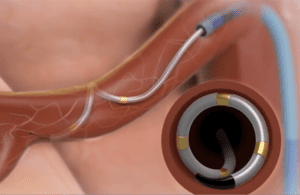
The SYMPLICITY HTN-3 clinical trial observed subjects who underwent radiofrequency renal denervation (RF RDN) with first-generation Symplicity. Results demonstrated a statistically significant reduction in office and ambulatory blood pressure compared to a sham control group.
Medtronic’s RDN minimally invasive procedure delivers radiofrequency energy to specific nerves near the kidneys that can become overactive and cause high blood pressure.
Data, presented at the 34th Transcatheter Cardiovascular Therapeutics (TCT) conference in Boston, was also published in The Lancet.
Analysts have remained bullish on Medtronic’s RDN treatment, despite last year’s news that it had to continue its pivotal Spyral HTN-ON MED trial into this year after failing to obtain the positive results needed to end enrollment early for the potential hypertension treatment. The present plan is for Medtronic to present Spyral HTN-ON MED results at the American Heart Association Scientific Sessions this November. Spyral HTN-ON MED is the final piece of Medtronic’s FDA submission for Symplicity Spyral.
Also, at TCT 2022, ReCor Medical announced that a trial for its Paradise ultrasound renal denervation (uRDN) treatment met its primary efficacy endpoint.
SYMPLICITY HTN-3 trial details
SYMPLICITY HTN-3 evaluated 535 patients with treatment-resistant hypertension, randomized 2:1. After six months, 101 patients in the sham arm underwent RDN treatment. At three years, the RDN group presented a 26.4 mm Hg reduction in office systolic blood pressure. That compared to a 5.7 mm Hg reduction in the sham group.
Patients experienced a 15.6 mm Hg reduction in 24-hour ambulatory systolic blood pressure in the RDN group. The sham group produced a 0.3 mm Hg reduction.
A total of 535 patients with treatment resistant hypertension were randomized 2:1 to RDN (n=364) vs. sham control (n=171). After six months, 101 patients in the sham control arm underwent treatment with RDN (crossover group). When conducting a longer-term analysis with all available data, and accounting for control crossover patients by using their last observation carried forward (imputation), the results through three years are as follows:
On average, 17.5% of RDN patients spent time in target range, compared to 8.2% in the sham group. Medtronic said Symplicity demonstrated long-term safety in line with expected outcomes for the patient population.
“These findings provide important insights into the evolution of patients’ blood pressure control, with and without renal denervation, in a scenario more akin to the real-world setting— under everyday physician management without the frequent follow up visits and monitoring that occur in research settings,” said Dr. Deepak L. Bhatt, executive director of Interventional Cardiovascular Programs at Brigham and Women’s Hospital and Professor of Medicine at Harvard Medical School and co-principal investigator for the trial.
Bhatt said the results illustrate that, for certain patients with high blood pressure, it remains poorly controlled. This puts them at risk for cardiovascular complications such as stroke, he added.
Medtronic found “much to learn” in trial data
“While we did not find a significant six-month blood pressure reduction difference in RDN versus sham in HTN-3, we felt that there was much to learn by following HTN-3 patients for a longer time period, particularly in those sham patients with sustained blood pressure elevations who ‘crossed over’ to RDN,” said Dr. Jeffrey Popma CMO for the Coronary & Renal Denervation business and the Structural Heart & Aortic business at Medtronic. “Using standard imputation methods for BP comparison in cross-over patients, we were pleased to see a sustained benefit in three-year blood pressure reduction in HTN-3 patients treated with RDN.
“This study adds important, incremental information to the totality of evidence now supporting the long-term effect of RDN in patients with hypertension. Documentation of medication compliance and improvements made to the new Spyral catheter may have the potential to further influence clinical outcomes in patients enrolled in the SPYRAL portfolio of studies.”
Medtronic is committed to pushing treatment forward
Jason Weidman, Medtronic SVP and president of the Coronary & Renal Denervation business, added that the data provides “a greater understanding” of long-term patient behavior and RDN impacts.
“We remain deeply committed to this adjunctive hypertension treatment option and look forward to data from additional studies, including the Spyral HTN-ON MED extension trial, which we plan to have at the American Heart Association Scientific Sessions, subject to acceptance,” Weidman said.
Medtronic’s Symplicity Spyral renal denervation is available in more than 60 countries. However, it remains investigational in the U.S., as well as in Japan and Canada.
In May, the company presented data demonstrating the benefit of the Symplicity blood pressure procedure with Simplicity Spyral.

